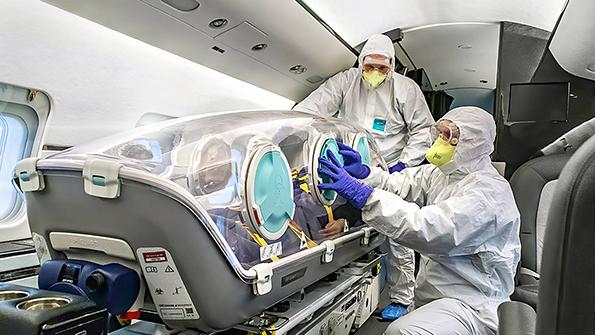
The aviation industry may be experiencing unprecedented challenges amid the COVID-19 pandemic, but there is one sector where work has intensified. Private air ambulance flights remain permitted, albeit under increasingly stringent limits. But the nature of the service, and the way operators can provide it, have had to change considerably.
FAI Aviation Group, based in Nuremberg, Germany, operates 11 aircraft dedicated to medical missions. Even under normal circumstances the company’s business model is complicated: Turning a profit requires most aircraft to complete multiple missions over several days away from their base, as FAI carries out work for travel insurers who demand the lowest possible cost and the company often competes with not-for-profit entities.
During the past few months, while its core business has remained the same, the way FAI has carried it out has changed substantially. At first, there was an uptick in bookings.
“Everyone was focusing on how to get people back home as quickly as possible,” says Volker Lemke, director of sales and marketing. “We saw cases where the travel-insurance industry would usually wait a little bit longer, with [insured patients] in hospital until the moment they could fly in a commercial airliner, to avoid an expensive ambulance case. But this possibility completely stopped.”
After an initial spike in late February and early March, Lemke says travel-insurance missions declined by 95%. Yet at the same time, the company experienced an uptick in direct bookings. The result was a record-breaking April for the ambulance division, as FAI worked to get mainly Middle Eastern nationals repatriated.
Staffing has, as a consequence, remained at pre-COVID levels. Many of the company’s medical personnel are supplied by a Hungarian firm with whom FAI has had a commercial relationship for several years. In the early days of the crisis, Hungarians were not allowed to leave their country, so FAI had to suspend the contract and recruit Germans. The composition and utilization of the company’s fleet changed, too.
“What happened very quickly was the majority of our Learjet fleet was grounded,” Lemke says. “Out of five aircraft in the ambulance fleet, we reduced to just one Learjet 60. The main task for this last Learjet is to meet one of our long-range aircraft when it returns to Germany, and we will take the passenger on to other European countries.
“Three months ago we planned for three Challenger 604s to be permanently in the ambulance fleet. At the moment we have four Challengers permanently available for ambulances, plus most of the time a Global Express as well.”
The reason behind this fleet redeployment was to meet the changing nature of the company’s missions.
At present, the company is flying fewer missions, but income is either unchanged, or even increasing, through a combination of careful route-planning, pre-positioning aircraft to places where crews still can stay overnight, and the higher value of individual long-haul segments versus greater numbers of shorter flights.
“The number of missions is perhaps 50% of the normal volume,” Lemke says, “but the turnover is on target. For the time being, this covers the costs of the whole company.”
While FAI expects the travel-insurance market to take several years to recover to pre-COVID levels, the additional business the company has generated during the pandemic ought to hold the firm in good stead.
“I’m expecting a really big growth in European travel-insurance-related cases, I’m expecting them to pick up again around September or October,” Lemke adds.
